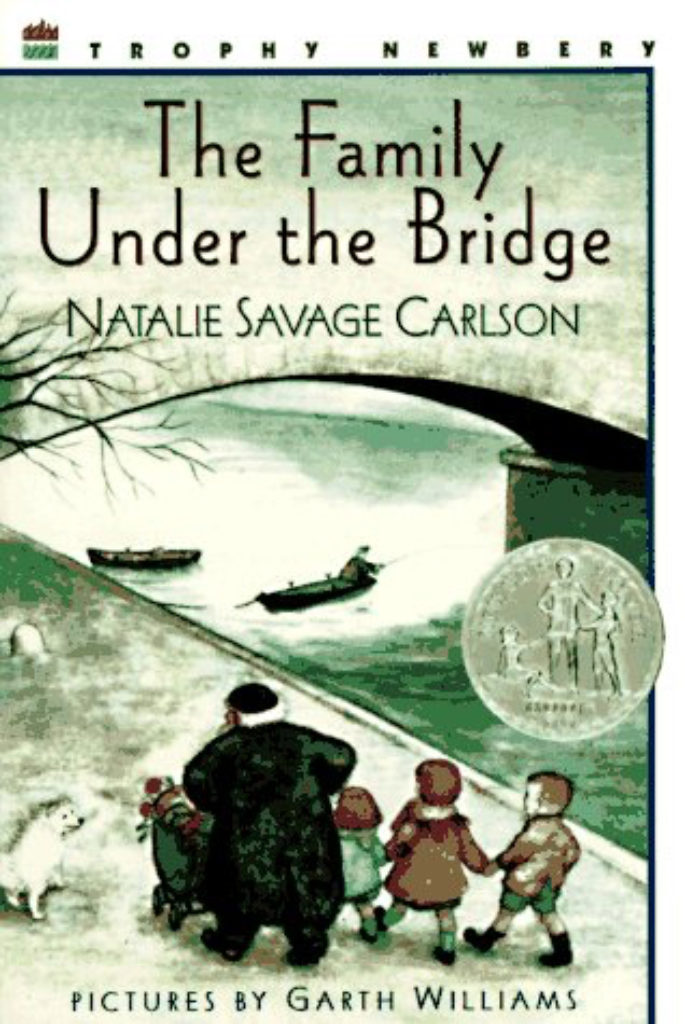The Family Under the Bridge by Natalie Savage Carlson has been reviewed by Focus on the Family’s marriage and parenting magazine.

The Family Under the Bridge by Natalie Savage Carlson has been reviewed by Focus on the Family’s marriage and parenting magazine.
Armand, an old hobo, lives under a bridge in Paris. He doesn’t mind a life of scavenging, since it means he has no responsibilities. One day, he finds three young children in his “home.” He knows children can steal people’s hearts, so he tries to shoo them away. When he discovers they and their mother are homeless, he begins to soften toward them.
The children, from oldest to youngest, are Suzy, Paul and Evelyne. Their mother, Madame Calcet, works during the day. When she returns to the spot beneath the bridge, she is not happy to find Armand. She is still prideful and unable to admit she is in the same position as the hobo.
Armand takes the kids around town and to the department store to meet Father Christmas the following day. He and the children are hungry, so he urges them to sing Christmas carols while he begs for money. He tells bystanders the children are orphans and he is their grandfather. They make enough money to buy plenty of food for themselves and their dog. When their mother sees the leftovers and learns how they got them, she’s even angrier with Armand.
Armand leaves to find another place to live. But the next day, he learns two well-dressed women are planning to put the children in a children’s home. He helps them pack quickly, promising he’ll come back that evening to find their mother and reunite the family.
Armand takes the kids to a gypsy camp where he has friends. The gypsies help the kids get settled. Madame Calcet is distraught when she learns the children are staying with “thieves.” Nevertheless, she thanks Armand for saving their family from being separated.
Some of the gypsies live in a little house on wheels, and they allow Madame Calcet and the girls to live inside with them while Paul sleeps in a tent. The Calcet kids love having playmates. They decide they want Father Christmas to bring them a little house on wheels so they can travel with the gypsies. They ask Armand to relay their wish to Father Christmas. Armand tells them several lies indicating they will soon have a house of their own.
When police raid the camp, looking for a particular man, the gypsy group packs up and leaves in a hurry. Armand and his new friends are left with only a tent. The kids already think of Armand as a grandfather, and he realizes he wants them all to be a family.
He decides to get a respectable job to make that happen. The kids and their mother help him clean up his appearance, and he goes to see about a night watchman job. He learns the position actually includes a house. The owner hires Armand, who is delighted he’ll be able to give his new family a home.
The gypsies believe the Christ child was a gypsy. Madame Calcet takes Armand and the kids to midnight mass at Christmas. When Madame Calcet calls the gypsies “thieves,” Armand says the gypsies don’t know there’s a commandment against stealing. He says homeless folks all need to stick together because they’re all God’s big, poor family.
The gypsies talk about saints and how they make an annual pilgrimage to the church where a gypsy named Saint Sara is buried.
Armand is content with his circumstances until he begins to love the Calcet children. Then he changes his life to make theirs better. Madame Calcet has a difficult time letting go of her bitterness and pride, but she softens as she begins to accept her new circumstances.
None
None
Get free discussion questions for this book and others, at FocusOnTheFamily.com/discuss-books.
Lying: Armand lies to the kids by saying a home is being built for them. He lies to bystanders when he’s begging for money.
You can request a review of a title you can’t find at reviewrequests@family.org.
Book reviews cover the content, themes and worldviews of fiction books, not their literary merit, and equip parents to decide whether a book is appropriate for their children. The inclusion of a book’s review does not constitute an endorsement by Focus on the Family.